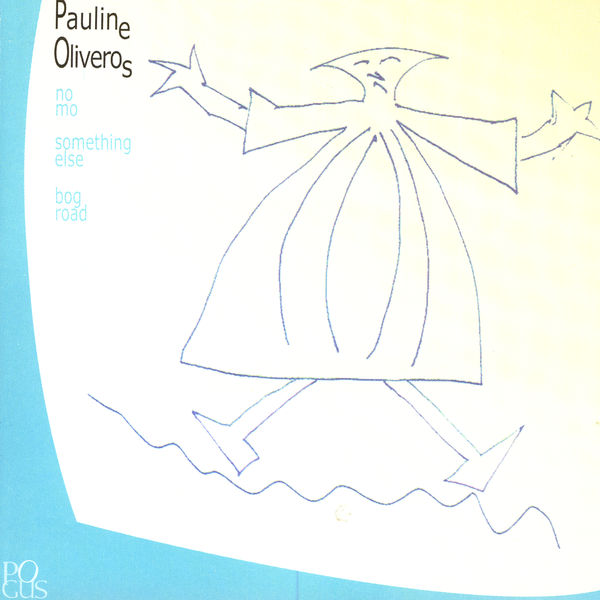
Musik-Streaming
Hören Sie dieses Album mit unseren Apps in hoher Audio-Qualität
Testen Sie Qobuz kostenlos und hören Sie sich das Album anHören Sie dieses Album im Rahmen Ihres Streaming-Abonnements mit den Qobuz-Apps
Abonnement abschließenHören Sie dieses Album im Rahmen Ihres Streaming-Abonnements mit den Qobuz-Apps
Download
Kaufen Sie dieses Album und laden Sie es in verschiedenen Formaten herunter, je nach Ihren Bedürfnissen.
Text in englischer Sprache verfügbar
No Mo is a collection of three early Pauline Oliveros pieces, the first two, No Mo and Something Else, were recorded at the University of Toronto in 1966 and Bog Road on a Buchla system at the Mills Tape Music Center in 1967. They reveal Oliveros as an electronic music pioneer in both a practical and an artistic sense; these works often find now-familiar electronic sounds in settings of uniquely Oliverine provenance, created in the near half-hour-long form she prefers, consisting of slowly evolving structures. The best of the three, Something Else, is unfortunately a fragment of only 14 minutes' duration. Oliveros establishes an eerie, static, slowly changing background with fractional foreground elements darting in and out of the landscape. In a psychological sense, Something Else is a very effective piece, capped off by a gist of sadness as the master tape skitters out of the playback -- there is no more to be heard.
Conversely, No Mo is more challenging to listen to as it is made up of some rather distorted, very high frequency sounds. A few minutes into it and your ears get accustomed to the piece, though it can be a rough ride for the opening. A little more subdued is the Buchla-generated Bog Road, which is enjoyable overall, although the concluding moments can't help sounding like a Space Invaders game. It's not Oliveros' fault that her vintage 1967 experimental creativity shares some commonality with mainstream noises from the future tense, but even though this is true it goes to demonstrate the sententiousness of her foresight.
© TiVo
Sie hören derzeit Ausschnitte der Musik.
Hören Sie mehr als 100 Millionen Titel mit unseren Streaming-Abonnements
Hören Sie diese Playlist und mehr als 100 Millionen Tracks mit unseren Streaming-Abonnements
Ab 12,49€/Monat

Pauline Oliveros, Composer, MainArtist
(C) 2001 Pogus (P) 2001 Pogus
Pauline Oliveros, Composer, MainArtist
(C) 2001 Pogus (P) 2001 Pogus
Pauline Oliveros, Composer, MainArtist
(C) 2001 Pogus (P) 2001 Pogus
Albumbeschreibung
No Mo is a collection of three early Pauline Oliveros pieces, the first two, No Mo and Something Else, were recorded at the University of Toronto in 1966 and Bog Road on a Buchla system at the Mills Tape Music Center in 1967. They reveal Oliveros as an electronic music pioneer in both a practical and an artistic sense; these works often find now-familiar electronic sounds in settings of uniquely Oliverine provenance, created in the near half-hour-long form she prefers, consisting of slowly evolving structures. The best of the three, Something Else, is unfortunately a fragment of only 14 minutes' duration. Oliveros establishes an eerie, static, slowly changing background with fractional foreground elements darting in and out of the landscape. In a psychological sense, Something Else is a very effective piece, capped off by a gist of sadness as the master tape skitters out of the playback -- there is no more to be heard.
Conversely, No Mo is more challenging to listen to as it is made up of some rather distorted, very high frequency sounds. A few minutes into it and your ears get accustomed to the piece, though it can be a rough ride for the opening. A little more subdued is the Buchla-generated Bog Road, which is enjoyable overall, although the concluding moments can't help sounding like a Space Invaders game. It's not Oliveros' fault that her vintage 1967 experimental creativity shares some commonality with mainstream noises from the future tense, but even though this is true it goes to demonstrate the sententiousness of her foresight.
© TiVo
Informationen zu dem Album
- 1 Disc(s) - 3 Track(s)
- Gesamte Laufzeit: 01:03:53
- Künstler: Pauline Oliveros
- Komponist: Pauline Oliveros
- Label: Pogus
- Genre: Pop/Rock Rock
(C) 2001 Pogus (P) 2001 Pogus
Verbesserung der Albuminformationen
 Warum Musik bei Qobuz kaufen?
Warum Musik bei Qobuz kaufen?
-
Streamen oder downloaden Sie Ihre Musik
Kaufen Sie ein Album oder einen einzelnen Track. Oder hören Sie sich mit unseren hochqualitativen Streaming-Abonnements einfach den ganzen Qobuz-Katalog an.
-
Kein DRM
Die heruntergeladenen Daten gehören Ihnen ohne jegliche Nutzungsbeschränkung. Sie können sie sooft herunterladen wie Sie möchten.
-
Wählen Sie das Format, das am Besten zu Ihnen passt
Sie können beim Download Ihrer Einkäufe zwischen verschiedenen Formaten (FLAC, ALAC, WAV, AIFF...) wählen.
-
Hören Sie Ihre Einkäufe mit unseren Apps
Installieren Sie die Qobuz-Apps für Smartphones, Tablets und Computer und hören Sie Ihre Musikeinkäufe immer und überall.


